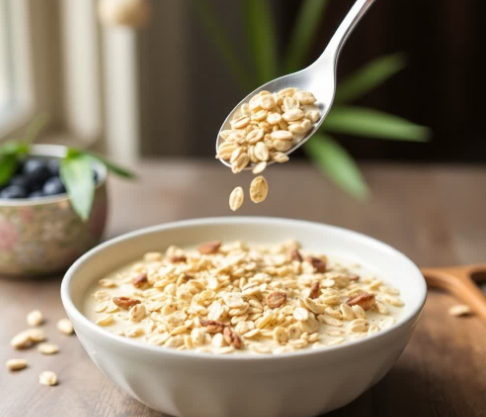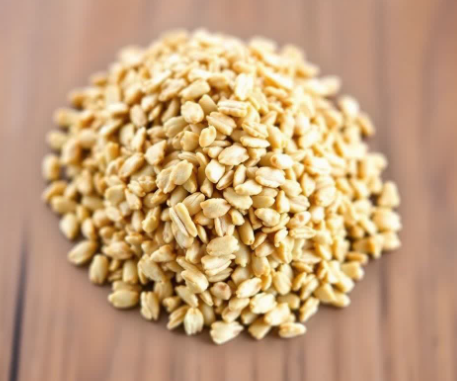Lower Your Cholesterol Naturally: Delicious Foods to Embrace
(Source: EatingWell)
Nourishing Your Heart: Delicious Foods That Can Help Manage High Cholesterol
Beyond Medication: Harnessing the Power of Diet for Cholesterol Control: As featured on EatingWell, managing high cholesterol doesn't solely rely on medication. Embracing a delicious and strategic dietary approach can significantly impact your cholesterol levels and overall heart health.
A Flavorful Prescription: Discovering Foods That Actively Work to Lower Bad Cholesterol: This article delves into various readily available and tasty foods that have been scientifically shown to help lower LDL ("bad") cholesterol and improve your lipid profile.
Making Heart-Healthy Choices: Practical and Enjoyable Ways to Incorporate Cholesterol-Lowering Foods into Your Diet: It provides practical tips and insights on how to integrate these beneficial foods into your daily meals, making heart-healthy eating both sustainable and enjoyable, even in places like Multan, Punjab, Pakistan, where these foods are generally accessible.
The Cholesterol-Lowering Powerhouse: Foods to Incorporate More Of
EatingWell highlights several food groups known for their cholesterol-managing properties:
1. Oats: The Breakfast Champion for Heart Health
Soluble Fiber Superstar: Oats are rich in soluble fiber, which dissolves in water to form a gel-like substance in your digestive tract.
Binding Cholesterol: This soluble fiber binds with cholesterol in the gut, preventing its absorption into the bloodstream.
Easy Integration: Enjoy a warm bowl of oatmeal for breakfast, add oats to smoothies, or use them in baking.
2. Barley and Other Whole Grains: Beyond Oats for Fiber Benefits
Similar Mechanisms: Like oats, barley and other whole grains such as brown rice and quinoa contain soluble fiber that aids in cholesterol reduction.
Versatile Options: Incorporate barley into soups and stews, choose whole-grain breads and pasta, and opt for brown rice or quinoa as side dishes.
3. Beans and Legumes: Plant-Based Power for a Healthy Heart
Rich in Soluble Fiber and Protein: Lentils, kidney beans, chickpeas, and other legumes are excellent sources of both soluble fiber and plant-based protein.
Satiating and Beneficial: They contribute to feelings of fullness and actively help lower LDL cholesterol.
Culinary Versatility: Add beans to salads, soups, stews, and curries, popular dishes in Multan and Pakistan.
4. Nuts: A Satisfying and Heart-Healthy Snack (in Moderation)
Healthy Fats, Fiber, and Phytosterols: Almonds, walnuts, peanuts, and other nuts contain monounsaturated and polyunsaturated fats (the "good" fats), fiber, and phytosterols.
Blocking Cholesterol Absorption: Phytosterols are plant compounds that structurally resemble cholesterol and can help block its absorption in the gut.
Portion Control is Key: Enjoy a small handful of nuts as a snack, add them to salads, or use them as a topping for yogurt or desserts. Be mindful of portion sizes due to their calorie content.
5. Seeds: Small but Mighty Cholesterol Fighters
Fiber, Omega-3s, and Phytosterols: Flaxseeds, chia seeds, and sunflower seeds are packed with fiber, omega-3 fatty acids (particularly ALA in flaxseeds), and phytosterols.
Multiple Benefits: These nutrients contribute to overall heart health and can help lower LDL cholesterol.
Easy to Add: Sprinkle seeds on yogurt, oatmeal, salads, or add them to smoothies and baked goods.
6. Fatty Fish: Omega-3 Rich for Heart Protection
Beneficial Fats: Fatty fish like salmon, mackerel, tuna, and sardines are rich in omega-3 fatty acids (EPA and DHA).
Reducing Triglycerides and Blood Pressure: While not directly lowering LDL cholesterol as significantly as soluble fiber, omega-3s help reduce triglycerides (another type of fat in the blood) and lower blood pressure.
Aim for a Few Servings Weekly: Include fatty fish in your diet a couple of times a week for optimal heart health benefits.
7. Fruits and Vegetables: Antioxidant-Rich and Fiber-Filled
Overall Health Boost: A wide variety of fruits and vegetables are rich in antioxidants and fiber, contributing to overall heart health.
Specific Benefits: Some fruits, like apples, grapes, citrus fruits, and berries, contain pectin, a type of soluble fiber.
Make Them Staples: Aim to include plenty of colorful fruits and vegetables in every meal and snack.
8. Foods Fortified with Plant Sterols or Stanols: Targeted Cholesterol Reduction
Concentrated Cholesterol Blockers: Some foods, like certain orange juices, yogurt drinks, and spreads, are fortified with plant sterols or stanols, which are highly effective at blocking cholesterol absorption.
Check Labels: Look for fortified products and incorporate them into your diet as directed.
Building a Cholesterol-Lowering Diet: Practical Tips
EatingWell emphasizes a holistic approach to diet:
Focus on Variety: Include a wide range of cholesterol-lowering foods for maximum benefit.
Prioritize Whole Foods: Choose unprocessed, whole foods over refined and processed options.
Limit Saturated and Trans Fats: Reduce your intake of red meat, processed meats, fried foods, and baked goods made with hydrogenated oils, as these can raise LDL cholesterol.
Read Food Labels: Pay attention to the saturated and trans fat content of packaged foods.
Combine with a Healthy Lifestyle: A cholesterol-lowering diet is most effective when combined with regular exercise and maintaining a healthy weight.
Conclusion: Delicious Steps Towards a Healthier Heart
As highlighted by EatingWell, managing high cholesterol through diet involves incorporating a variety of delicious and readily available foods. By focusing on soluble fiber-rich options like oats, barley, beans, and fruits, embracing healthy fats from nuts and fatty fish, and considering fortified foods, individuals in Multan, Punjab, Pakistan, and elsewhere can take proactive and enjoyable steps towards lowering their LDL cholesterol and nurturing a healthier heart. Remember to consult with a healthcare professional or registered dietitian for personalized dietary advice.
Labels: Lower Your Cholesterol Naturally: Delicious Foods to Embrace













0 Comments:
Post a Comment
If you have any doubt, please let me know
Subscribe to Post Comments [Atom]
<< Home